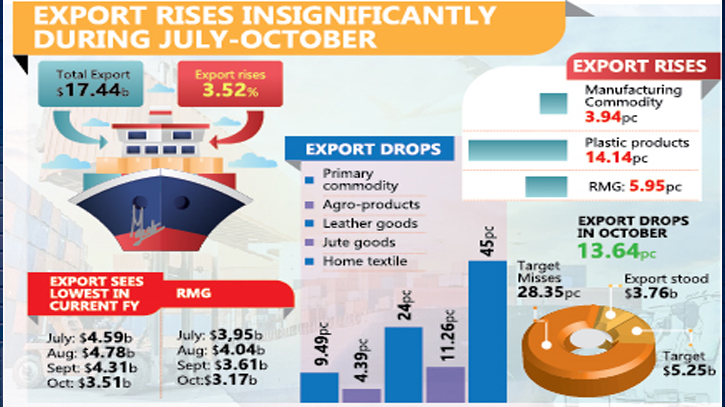
Photo: Messenger
Exports, the major foreign currency earner sector, experienced the lowest performance in the current fiscal year as the world economy is under inflationary pressure.
In October, the country fetched $3.76 billion while exports dropped by 13.64 percent, which is the lowest in the current fiscal year, the Export Promotion Bureau (EPB) states.
According to EPB, during July–October 2024 FY, Bangladesh exported an aggregate of $17.44 billion, a growth of 3.52 percent. Concerns think that the exporters should place emphasis on expanding the markets in new destinations to avoid unexpected circumstances.
In July of the current fiscal year, exports were $4.59 billion, $4.78 billion in August, and $4.31 billion in September, while ready-made garment exports stood at $3.95 billion, $4.04 billion, and $3.61 billion in October, respectively. However, this growth fell short of the government's target by 9.31 percent.
Except for garments, major export products show a negative figure. Exports of primary commodities drop by 9.49 percent, agro-products by 4.34 percent, leather and leather goods by 24 percent, jute and jute goods by 11.26 percent, and home textiles by 45 percent.
At the same time in the current year, plastic product exports grew by 14.14 percent and manufacturing products by 3.94 percent. This means exports have gone down by 513 million dollars in this single month, which is equivalent to around 5,643 crore taka.
Faruque Hassan, President of the Bangladesh Garment Manufacturers and Exporters Association (BGMEA), said, “In fact, the pulse of the global market is showing depressed sales and demand caused by historic high inflation followed by the Russia-Ukraine war.”
He said, “To curb inflation, advanced economies increased bank interest rates, which is limiting the purchasing power of consumers and demand for goods. The ongoing Israel-Hamas war has added further fuel to the crisis. Our analysis suggests that the year 2023 will not be able to sustain the trade level of 2022. There will be some decline in the apparel trade in 2023, and we will have to face the heat of it to some extent."
Nevertheless, the ongoing labour unrest, which has allegedly sparked around the minimum wage issues, has seriously interrupted the industry and exports for the past week. This has led to a decline in exports in October. While the minimum wage review is under way and the Minimum Wage Board is working within its given time, such violent protests are unfortunate, and this affects the activities of the wage board.
Hassan said, “We know all the workers representatives and government are working hard to contain the situation; we need wholehearted support from all to restore discipline in the industry for our common interest. While we are passing through a turbulent time globally, such incidents will not be helpful to bend the export growth curve up, and we cannot afford any adverse impact on employment and foreign exchange earnings caused by anarchy in the industry."
Messenger/Sajib








